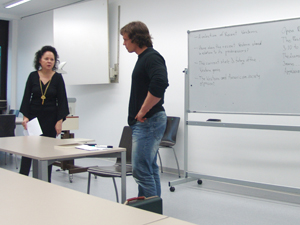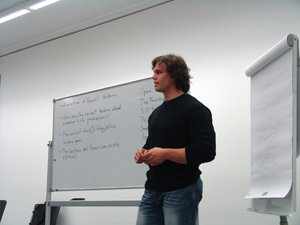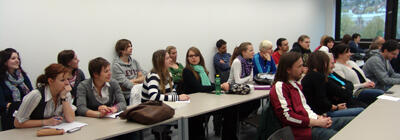American Corner Innsbruck
Lecture by Mag. Robert Spindler
NEW WESTERN FILMS
April 14, 2010, 7.00 p.m., SR 50105/2 (Bruno-Sander-Haus, 1st floor)


In his presentation on what could be labeled the American genre, Mag. Spindler talked about the Western’s development throughout the 20th century, the relationship between more recent productions and their predecessors, and the current state of the Western and its importance in contemporary American society.
The Western, as Mag. Spindler pointed out, is not only the oldest, but also probably the most resilient genre. Covering the last hundred years, our presenter traced its development from the beginnings with The Great Train Robbery (1903), its ossification of formulaic patterns in the following decades, the onset of deconstruction especially in the 1960s to the few productions that straggled in during the 1980s (e.g. Heaven’s Gate, a major box office disaster whose title ironically reflects the genre’s near-death experience) and the reanimation attempts by Kevin Costner (Dances with Wolves) and Clint Eastwood (Unforgiven) in the early 1990s.
Using the year 2000 as his demarcation point for the classification of recent Westerns, Spindler then gave a brief overview of five large-scale productions, Open Range (2003), The Missing (2003), 3:10 to Yuma (2007), The Assassination of Jesse James by the Coward Robert Ford (2007), and Appaloosa (2009). In an attempt to locate where these productions stand in relation to their predecessors, Spindler argued that they are suspended between deconstruction and nostalgia, two opposing themes that characterize the Western of the 21st century. As far as the genre’s future is concerned, however, he emphasized the difficulty of auguring any trends, as the majority of recent productions should be seen as the respective directors’ personal (and frequently nostalgic) projects, rather than as an indication of the audience’s demands.
The concluding discussion of the current and future state of the Western as well as its relation to American society yielded various interesting conjectures ranging from the discrepancy between the genre’s essentially conservative stance and revisionist attempts at redefining it to the assumption that the Western, being a huge category consisting of myriad productions, is so deeply ingrained in the American mind that it will continue to exist, albeit in different forms that will eventually require new classifications.
(text: Andreas Leisner)

Abstract:
The Western is a film genre of superlatives and paradoxes. It is the oldest narrative film genre of all and has produced some of the worst and some of the greatest films of all times. No other genre combines such genre limitations with such great variation. It once was the most popular of genres but now might well be the least popular. It has been declared dead several times – but is still breathing, faintly, that is, if one watches closely. And this is exactly what I did: I analyzed and studied almost every major film production that came out after the year 2000 and that can be defined as a Western, even in the remotest sense. Most of these films require a makeshift subgenre specification such as “Neo-Western,” “Post-Western,” or “Pro-Western.” The more prototypical ones of the last decade are only a fistful of films.
In my talk I will analyze a selection of these films to demonstrate where the recent Western stands in relation to its predecessors and speculate on the current state and on the future of the Western genre and what this could tell us about American society at present.
Robert Spindler
Mag. Robert Spindler is an independent (hobby) filmmaker and lecturer at the Department of American Studies. His diploma thesis focused on deconstruction and nostalgia in recent Westerns. In 2008, Robert Spindler won the audience award at the student film festival “Filmriss” in Salzburg for his feature-length film “McFinnen & Wallace.” He is currently working on his PhD thesis “Screening Gawain: Refashioning of a Medieval Hero” and a short film project “The Fencers.”


